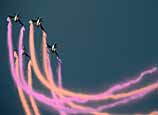
Out of all the great tragedies that befell the Chinese nation, why did you choose this one?
The novel by Liu Zhenyun is seemingly about Henan province, but it's actually about the whole nation. Very few, even in China, know about the 1942 famine. Ours is a nation that forgets so many of our calamities that it's doubtful we can prevent it from happening again.
You chose a panoramic view, from the village to the province, all the way to the central government, even incorporating outsiders' perspectives like those of the journalist. Why use such a novel approach?
It's not only new in my work, but it's never been done before in Chinese cinema. There are three things that made it almost impossible to film the story: First, the original novel is in the style of investigation, with no central plotline; second, the character groups — the refugees and the officials — do not interact with each other, but are parts of a whole; third, a writer, a director and a film company have to persevere for 19 years for a project that no smart people would touch.
Isn't it luxury casting to include Adrien Brody and Tim Robbins in an ensemble?
There is no lead in this film. Everyone is a supporting actor, and we used the best. The two Hollywood stars knew their parts. They did not come for star roles or star salaries. But they worked so hard for what they saw as a good script.
Aftershock is also about death. Yet this movie feels so different in its portrayal of massive number of deaths.
Human beings can feel sadness when caught in desperation but still see hope for survival. If there is no hope, but only helplessness, they'll be numb, just like the wild weeds that sprout in ruins and chilly winds. Their one and only need is to eat, and they would resort to anything, even cannibalism.















 10th China Int'l Auto Exhibition to be held in Guangzhou
10th China Int'l Auto Exhibition to be held in Guangzhou


![]()
